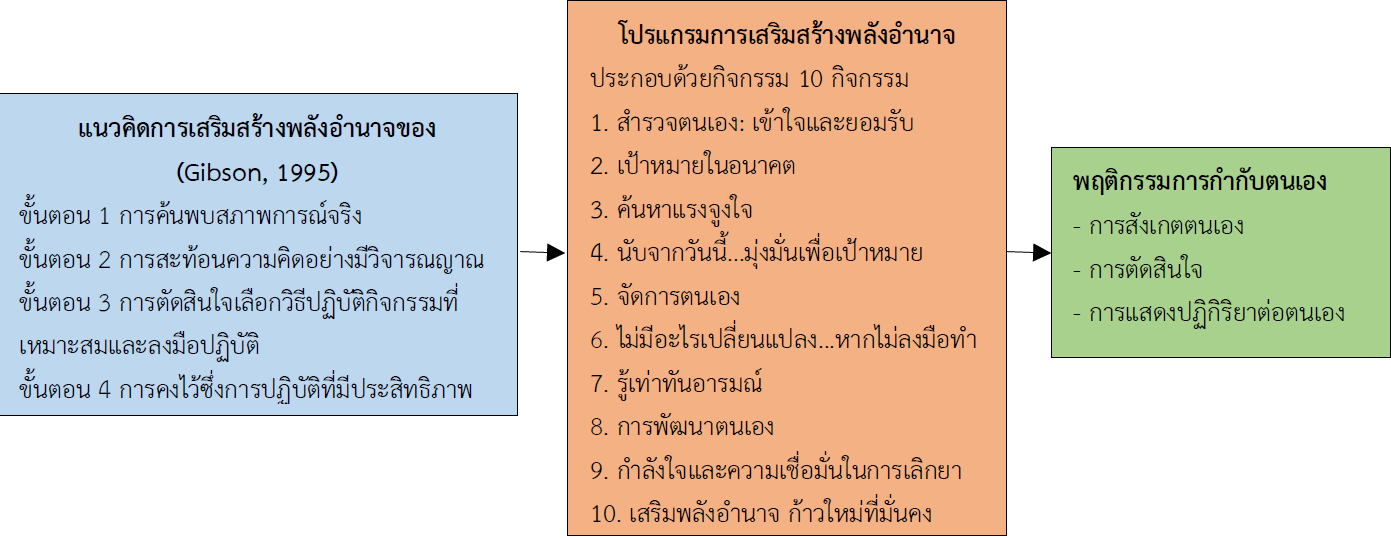การพัฒนาและผลของโปรแกรมการเสริมสร้างพลังอำนาจต่อพฤติกรรมการกำกับตนเอง เพื่อการเลิกยาเสพติดของผู้ป่วยยาเสพติดแอมเฟตามีนในระยะฟื้นฟูสมรรถภาพ
คำสำคัญ:
โปรแกรมการเสริมสร้างพลังอำนาจ, พฤติกรรมการกำกับตนเอง, ผู้ป่วยยาเสพติดแอมเฟตามีน , การเลิกยาเสพติดบทคัดย่อ
การวิจัยและพัฒนามีวัตถุประสงค์เพื่อพัฒนาและทดสอบผลของโปรแกรมการเสริมสร้างพลังอำนาจต่อพฤติกรรมการกำกับตนเองเพื่อการเลิกยาเสพติดของผู้ป่วยยาเสพติดแอมเฟตามีนในระยะฟื้นฟูสมรรถภาพ ดำเนินการ 3 ระยะ คือ 1) พัฒนาโปรแกรมการเสริมสร้างพลังอำนาจ ประกอบด้วย วิเคราะห์สถานการณ์โดยการทบทวนเวชระเบียน การสนทนากลุ่ม สัมภาษณ์เชิงลึกและการทบทวนวรรณกรรม 2) ทดลองใช้โปรแกรมฯ โดยผ่านการตรวจสอบเนื้อหาโดยผู้ทรงคุณวุฒิ 5 คน ได้ค่าความสอดคล้องระหว่างข้อคำถามระหว่าง .8 – 1.0 และพฤติกรรมการกำกับตนเองได้ค่าความตรงเชิงเนื้อหา .76 นำโปรแกรมทดลองใช้กับกลุ่มตัวอย่าง จำนวน 10 คน ปรับปรุงโปรแกรมและ 3) ทดสอบผลการใช้โปรแกรมฯ หลังสิ้นสุดทันที 1 เดือน และ 3 เดือน จากกลุ่มตัวอย่างเข้ารับการรักษาแบบผู้ป่วยในระยะฟื้นฟูสมรรถภาพ จำนวน 59 คน โดยกลุ่มควบคุม (29) คน และกลุ่มทดลอง (30 คน) เครื่องมือวิจัยประกอบด้วย 1) โปรแกรมการเสริมสร้างพลังอำนาจ และ 2) แบบประเมินพฤติกรรมการกำกับตนเองเพื่อการเลิกยาเสพติด ได้ค่าความเที่ยงสัมประสิทธิ์แอลฟาครอนบาคเท่ากับ .96 วิเคราะห์ข้อมูลด้วยสถิติพรรณนา สถิติ Repeated Measure ANOVA และวิเคราะห์เชิงเนื้อหา ผลการวิจัยพบว่า
1. โปรแกรมการเสริมสร้างพลังอำนาจประกอบด้วย โปรแกรมการเสริมสร้างพลังอำนาจ เป็นกิจกรรมกลุ่ม ๆ ละ 60 - 90 นาที จำนวน 10 กิจกรรม สัปดาห์ละ 3 ครั้งเป็นเวลา 4 สัปดาห์ และคู่มือการเสริมสร้างพลังอำนาจสำหรับผู้ป่วย
2. เมื่อเวลาผ่านไป ความแตกต่างของค่าเฉลี่ยคะแนนพฤติกรรมการกำกับตนเองเพื่อเลิก ยาเสพติดของผู้ป่วยยาเสพติดแอมเฟตามีนระหว่างกลุ่มทดลอง และกลุ่มควบคุม ในระยะก่อนและ หลังสิ้นสุดโปรแกรมฯ ติดตาม 1 เดือน และ 3 เดือน แตกต่างกันอย่างมีนัยสำคัญทางสถิติ (F = 761.640, p < .001)
โปรแกรมการเสริมสร้างพลังอำนาจของผู้ป่วยยาเสพติดแอมเฟตามีนสามารถเพิ่มพฤติกรรมการกำกับตนเองเพื่อการเลิกยาเสพติดในระยะฟื้นฟูสมรรถภาพได้ ดังนั้นพยาบาลควรนำโปรแกรมนี้ไปใช้กับผู้ป่วยระยะฟื้นฟูสมรรถภาพในโรงพยาบาลธัญญารักษ์ โรงพยาบาลชุมชน โรงพยาบาลทั่วไป โรงพยาบาลศูนย์ และสถานฟื้นฟูสมรรถภาพผู้ติดยาเสพติด
เอกสารอ้างอิง
Bandura, A. (1977). Social Learning Theory. Retrieved August, 27, 2022, from http://www.rpi.edu/~ verwyc/bandura.html
Burns, N., & Grove, S. K. (2009). The Practice of Nursing Research: Appraisal, Synthesis, and Generation of Evidence (6th). Missouri: Saunders Elsevier.
Detdee, S. & Nukaew, O. (2021). The development and effects of empowerment program on self-care behavuors among patients with substance-induced psychotic disorder. The Journal of Psychiatric Nursing and Mental Health, 35(1), 91-111. (in Thai)
Gibson, C.H. (1995). The process of empowerment in mothers of chronically ill children. Journal of Advance Nursing. 21, 1201-1210.
Gibson, C. H. (1993). A Study of Empowerment in Mother of Chronically Ill Children. Unpublished
Doctoral Dissertation, Boston college, Boston.
Joanna Briggs Institute for Evidence Based Nursing & Midwifery. (2008). Reviewers’ s Manual. Retrieved January 25, 2022 from http://www.joannabriggs.edu.au
Kongsut, P., Chaisri, S., & Teangtum, S. (2013). The development empowerment program on management with drinking behavior of alcohol dependence patients. The Journal of Psychiatric Nursing and Mental Health, 27(1), 45-61. (in Thai)
Nilaban, S., Sriherun, B., & Kongthong, U. (2016). Causal relationship of factors affect relapsing behavior of methamphetamine. Journal of Graduate Studies Valaya Alongkron Rajabhat University, 10(1), 82-84. (in Thai)
Office of the Narcotics Control Board. (2021). Report Performance Prevent and Suppress Drugs Annual Budget 2021. Bangkok: Office of the Narcotics Control Board. Retrieved January 30, 2022, from https://www.oncb.go.th/EBookLibrary/annual%20report%202564.pdf
Polit, D.F., & Beck, C.T. (2012). Essentials of Nursing Research: Appraising Evidence for Nursing Practice. 8th Ed, Wolters Kluwer Health/Lippincott Williams & Wilkins, Philadelphia.
Phuakpong, K., Bunthumporn, N., & Somprasert, C. (2018). The effects of an empowerment program on the self-control of amphetamine use disorder patients. Journal of The Royal Thai Army Nurses, 19, 118-128. (in Thai)
Phurungruangphon, S. (2019). Narcotics Act, B.E. 2522. Retrieved on January 28, 2021 from https://www. chiangmaihealth.go.th/cmpho web/document/ 190816156591830384.pdf.
Pochnagone, S. (2020). The empowerment model for addicted patients and family to prevent relapse. Journal of Social Science and Buddhistic Anthropology, 5(12), 305-232. (in Thai)
Puntong, B., & Kimsungnoen, N. (2014). Effectiveness of self-efficacy and family support program on addiction behaviors in patients with amphetamine dependence in the National Institute of drug Abuse Treatment. Journal of Health Science, 23(1), 62-68. (in Thai)
Ratthaman, N., & Dangdomyout, P. (2017). The effect of empowerment with family participation
program on alcohol drinking behavior of schizophrenic patient with alcohol use. The Journal of Psychiatric Nursing and Mental Health, 31(3), 99-112. (in Thai)
Sangsa-nguan, K., Nukeaw, O., Chatarat, P., & Khanhansuk, P. (2023). The development of the empowerment program on caring behaviors among caregivers of children with Learning disability. The Southern College Network Journal of Nursing and Public Health, 10(2), 1-13. (in Thai)
Thanyarak Songkhla. (2022). Medical Record Audit Annual Statistic Report Songkhla. Songkhla: Thanyarak Songkhla. (in Thai)
United Nations Office on Drugs and Crime. (2021). Drug Market Trends: Cocaine Amphetamine Type Stimulants. United Nations Publication, Sales No. E.21.XI.8. New York: United Nations; 2021 Retrieved January 25, 2022 from https://www.unodc.org/res/wdr2021/ field/WDR21_ Booklet_4.pdf
Uten, K., Ratsamesuwiwat, J., & Yasin, W. (2022). The development of integrative program on release prevention among persons with amphetamine induce psychotic disorder. The Journal of Psychiatric Nursing and Mental Health, 36(3), 46-70. (in Thai)

ดาวน์โหลด
เผยแพร่แล้ว
ฉบับ
ประเภทบทความ
สัญญาอนุญาต
ลิขสิทธิ์ (c) 2024 วารสารเครือข่ายวิทยาลัยพยาบาลและการสาธารณสุขภาคใต้

อนุญาตภายใต้เงื่อนไข Creative Commons Attribution-NonCommercial-NoDerivatives 4.0 International License.
1. บทความหรือข้อคิดเห็นใด ๆ ที่ปรากฏในวารสารเครือข่าย วิทยาลัยพยาบาลและการสาธารณสุขภาคใต้ ที่เป็นวรรณกรรมของผู้เขียน บรรณาธิการหรือเครือข่ายวิทยาลัยพยาบาลและวิทยาลัยการสาธารณสุขภาคใต้ ไม่จำเป็นต้องเห็นด้วย
2. บทความที่ได้รับการตีพิมพ์ถือเป็นลิขสิทธิ์ของ วารสารเครือข่ายวิทยาลัยพยาบาลและการสาธารณสุขภาคใต้







